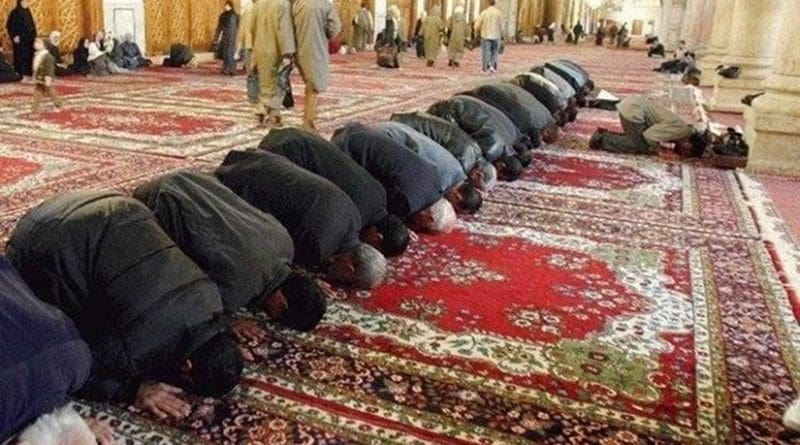Politicized Islam Leads To ‘Violent Religion’ View – OpEd
A survey by the nonpartisan Pew Research Center released December 15 found that a large majority of white evangelical Protestants, as well as smaller majorities of older Americans and those with less education, said Islam is more likely than other religions to encourage violence among its believers.
Overall, Americans split evenly on the question of whether Islam is more likely to encourage violence than other religions, with 46% saying it is more likely to do so and 45% saying it was not, the Pew poll found. That close division has been constant for most of the last decade in Pew polls. But the partisan divide on the issue has grown since George W. Bush was President, when those who identified with one of the two parties largely agreed on the issue.
Today, among Republicans, 68% call Islam more violent, Pew found, while among Democrats, only 30% did. Among people who identified themselves as conservative Republicans, 77% called Islam violent, while among self-identified liberal Democrats, 73% said it was no more violent than other religions. Even among Americans younger than 30, about one-third say Islam is more likely to encourage violence, while among Americans older than 65, more than half do, Pew found. That is bad news.
And another poll released a month prior to Pew shows that a majority of Americans (56%, including even larger majorities in all the major Christian denominations) say the values of Islam are at odds with American values according to the Public Religion Research Institute’s annual American Values Survey (of 2,695 U.S. adults).
Three large groups of Americans had a major increase in Islamophobia; and three smaller groups only had a small rise, or no raise at all.
The three groups of Americans having large numbers of people agreeing with the statement that the values of Islam are at odds with American values are:
- white evangelical Protestants (up 14 points to 73 percent from 59 percent in 2011);
- white mainline Protestants (up 16 points to 63 percent from 47 percent);
- and Catholics (up 20 points to 61 percent from 41 percent).
The three groups that did not show a significant rise in Islamophobia are all American minorities: only 55 percent of black Protestants said Islamic values were incompatible with American values (up only 4 points from 51 percent) ; and among Jews and “nones,” people who claim no religious label, there was no rise at all, because statistically speaking a one point difference (to 42 percent from 41 percent) is within the surveys margin of error.
Even the good news that a poll by the Washington Post and ABC News released a day prior (12/14/15) to the Pew report; which also asked whether Americans think Islam encourages violence, got very different results because the question was worded differently than the one in the Pew poll. This poll found that only 28% of Americans thought that “mainstream Islam encourages violence against non-Muslims” while 54% called it a “peaceful religion”.
It is hard to feel that a poll that finds that only 54% of Americans call mainstream Islam a peaceful religion is good news for Muslims. Partly this is due to the news media.
Why is nationalist terrorism by Chechens and Palestinians who are Muslims, called Islamic terrorism; when no one called decades of sectarian terrorism in Ireland: Christian terrorism?
Why blame Islam for the disgusting acts of those terrorists who simply invoke Islam to justify their dastardly acts of mass murder and mayhem?
Another reason is that Christians have long forgotten the 17th century, 30 year war of Catholics and Protestants, in the German lands; where almost one third of the population was massacred.
They do not realize that it was a call from the Pope to conquer the Holy Land that started more than a century of holy wars by the Crusaders nor do they remember that the America’s Salem witch hunt was led by Protestant ministers.
The lower percentage of Jews with Islamophobic fears is partly because all rabbis know that during the ten plus centuries of the Medieval Age, Jews were persecuted much less in Muslin countries than they were in Christian countries. Even today, Muslim extremist terrorists have slaughtered many more Muslim victims, than the number of Christian and Jewish victims combined.
In fact, in 2014 according to the Global Terrorism Index, the Islamic State slaughtered 6,073 people, the great majority of them Muslims; and Boko Haram murdered even more victims—6,644.
Islam is not more violent than medieval Christianity or Biblical Judaism. But in the last two centuries, western democracies have learned the importance of the principle of separation of Church and State to civil peace. Also the wide spread separation of Church and State that is now normal in Europe and North America has kept religion out of political and military conflicts between different nations.
Unfortunately, this important lesson has not yet become the norm in Muslim lands. Until Islam is fully depoliticized, and somewhat privatized, as it is in the U.S.A., political movements will use religion to motivate violent acts.
For it is sadly true as Pascal, a 17th century French philosopher once proclaimed, “Men never do evil so completely and cheerfully as when they do it from religious conviction.”
Everyone should be constantly reminded that religious extremism is ultimately self-destructive to its self, and its supporters. In the words of the poet W. B. Yeats: “Things fall apart; the center cannot hold…The best lack all conviction, while the worst are full of passionate intensity.”
The time has come for all the best of religious conviction, to denounce and denigrate the activities and beliefs of those who are filled with the worst of religious conviction, before they desecrate and diminish us all.

